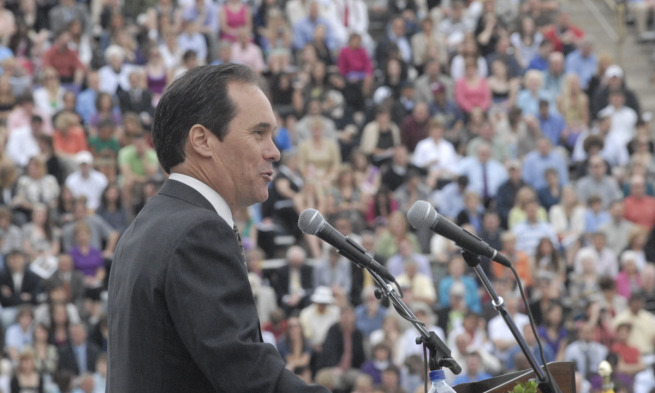Venture and gain
Being the Change
Green shoots after a long winter
By Andy Perrine ('86)
Some may think capitalism is a rough way to sort things out. In light of the last three years' economic turmoil, you may even wonder whether capitalism is the most fair and effective economic system.
Paul Holland ('82) is one guy whose feelings for capitalism are undiminished. He is the executive producer of the documentary Something Ventured, which premiered at the South by Southwest festival in March. The film's official subtitle, Risk, Reward and the Original Venture Capitalists, is an accurate yet bloodless description compared to The New York Times, which proclaimed the flick to be a "genuine love story about capitalism." Atari, Intel, Cisco Systems, Genentech and Apple are some of the companies founded on money provided by venture capitalists featured in the film. "These are very pointed stories about American companies that actually build things," Holland said in The N.Y. Times. "And while it's important to me that people who watch the film see how capitalism can be a creative force, bottom line is that these are great stories. Epics, really."
Something Ventured arrives at a pivotal time in the American economy. Holland, a venture capitalist himself and member of the JMU College of Business Executive Advisory Council, told the Times, "This film is one of the green shoots after a long winter." Emerging from a brutal season of decline and uncertainty, the American economy is growing again. Unemployment has persisted stubbornly, however, and some believe that a fundamental shift may have occurred right before our eyes.
Author Seth Godin said recently on the program Marketplace, "The guys in Detroit who did everything the foremen told them to — they're just plain out of luck. This economic recession we're living through is about two things. … the cyclical one, that's over. But the other one, the more permanent one, is about the fact that the Industrial Age is dying." Godin, who was promoting his new book, Poke the Box, went on to say, "This age that started with Henry Ford is dying on our watch. This is the industrial revolution of our time."
Labor statistics bear a message
Either the industrial age is dying, as Godin describes, or industrial jobs are simply leaving the United States for emerging economies where labor is cheaper. Whichever condition is true, the evolution from a traditional to a knowledge-based economy plays out clearly in American employment figures. The Bureau of Labor Statistics reports that while overall unemployment still hovers just below 9 percent this spring, for those with a bachelor's degree or higher unemployment is 4.5 percent. In fact, during the worst part of the recession, when overall unemployment exceeded 10 percent, the rate for those with college degrees never rose much past 5 percent.
In light of these labor figures and the obvious connection between education and employment, the recent trend of disinvestment in higher education among a majority of American states appears counterintuitive — especially during a recession when we ought to be searching for investments that help restore economic strength. According to the Center on Budget and Policy Priorities, 43 states cut funding to higher education in recent years. Meanwhile, emerging economies overseas are busily funding higher education in hopes of matching what is viewed around the planet as American superiority in education.
Curriculum to meet changing needs
Holland's belief in the value of higher education is one of the reasons he maintains a position on the JMU College of Business Advisory Committee, which assists the college in relating its programs and curriculum to the changing needs of business and society. He leads study missions for current business students to visit JMU alumni at companies including Apple, Google and salesforce.com. And he recommends JMU's entrepreneurship and sustainability programs as areas where the university has become an early leader in providing cutting-edge opportunities for students.
As seismic scale forces continue to shape our American society and economy, preparing for what lies ahead will force a set of priorities that may not always be clearly understood or agreed upon. However, decisions conducive to higher education are an investment in our knowledge-based economy, prosperity and social vitality.
In this context, Holland's film Something Ventured is far more than a paean to capitalism. Events depicted in the film during the late '50s, '60s and early '70s in Northern California arguably mark the start of our shift from an industrial to a knowledge-based economy. In a key scene Mike Markulla of Apple says, "You could walk down the street in 1976 and talk to a hundred people and say, 'Would you like a personal computer?' They'd say, 'What's that?'" Not only is the personal computer now essential to nearly every sector of society, according to the National Venture Capital Association, venture-backed corporate revenue also accounts for 21 percent of U.S. gross domestic product. The speed of this transformation is blinding. Not since the late 19th century and early 20th century has business transformed society so fundamentally. Capitalism may be rough, and Godin may be right about the guys in Detroit being out of luck; but we're highly adaptable creatures. And we can learn.
Learn more about the film at http://somethingventuredthemovie.com.
